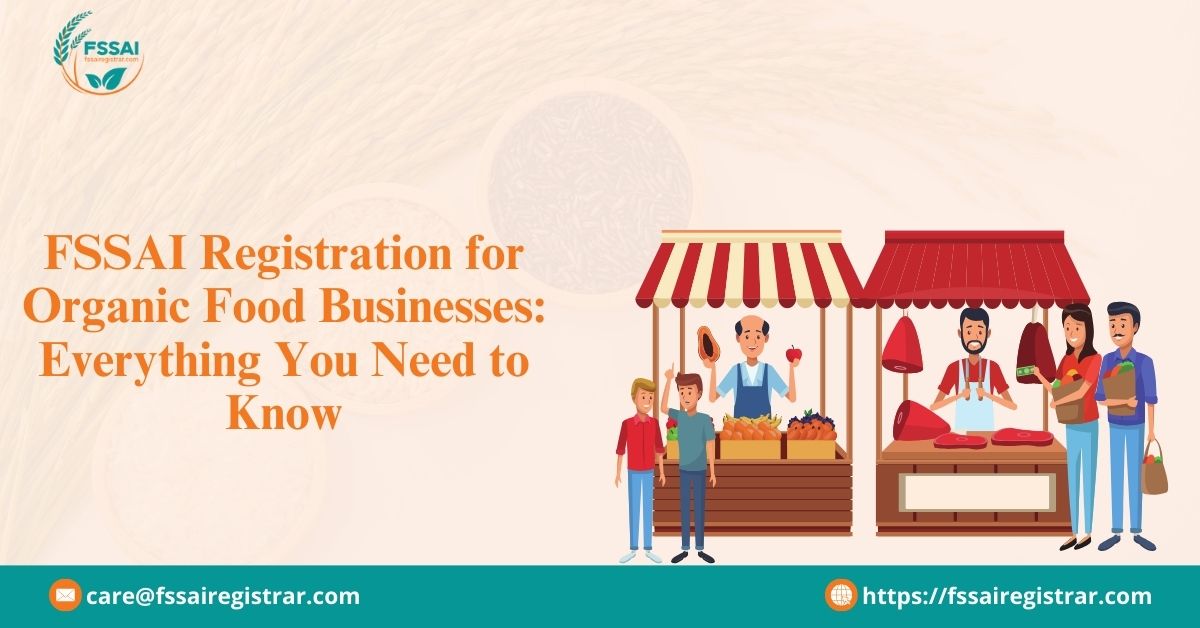As the demand for organic food continues to rise in India, food businesses in the organic sector are facing a growing need for legal compliance to ensure food safety and quality. For organic food businesses, obtaining FSSAI registration is a crucial step in establishing credibility and gaining consumer trust. This comprehensive guide will walk you through everything you need to know about FSSAI registration for organic food businesses, from its significance to the step-by-step process and its benefits.
What is FSSAI?
The Food Safety and Standards Authority of India (FSSAI) is a government body established under the Food Safety and Standards Act, of 2006. It is responsible for regulating food safety standards, issuing licenses, and overseeing the quality control of food products in India. FSSAI registration or licensing is mandatory for all food businesses in India, including those that produce, process, package, store, distribute, or sell food.
Why is FSSAI Registration Important for Organic Food Businesses?
Organic food businesses require FSSAI registration for several key reasons:
Legal Requirement: Just like any other food business, organic food producers and sellers are legally bound to register with the FSSAI. This ensures that the food being sold meets the safety standards prescribed by the government.
Consumer Trust and Confidence: With increasing awareness of food safety and organic certification, consumers look for assurance when purchasing organic food. FSSAI registration adds an extra layer of credibility, showing that your business follows the safety guidelines and delivers quality products.
Market Expansion: Whether you operate a small local organic farm or a large-scale organic food production company, FSSAI registration can open doors to national and international markets. Many retailers and e-commerce platforms require FSSAI registration as a prerequisite for listing products.
Ensuring Organic Integrity: The FSSAI works in conjunction with the National Programme for Organic Production (NPOP), ensuring that organically produced food meets the required standards. Organic food businesses that are FSSAI-registered are more likely to comply with organic labeling regulations, protecting consumers from fraudulent claims.
Types of FSSAI Licenses
Before applying for FSSAI registration, it’s essential to understand the types of licenses based on the scale of your business. FSSAI offers three different types of licenses:
- Basic FSSAI Registration: This is for small organic food businesses with an annual turnover of up to INR 12 lakhs. It is ideal for organic farmers, home-based food vendors, or small local stores.
- State FSSAI License: Organic food businesses with an annual turnover between INR 12 lakhs and INR 20 crores are required to obtain a State FSSAI License. This applies to medium-scale businesses, such as organic food processing units or larger retail stores.
- Central FSSAI License: For organic food businesses with an annual turnover exceeding INR 20 crores or those involved in import-export activities, a Central FSSAI License is required. This is necessary for large-scale organic producers, exporters, or importers.
Organic Certification vs. FSSAI Registration
It’s important to note that FSSAI registration is not the same as organic certification. Organic certification is a separate process governed by agencies like the Agricultural and Processed Food Products Export Development Authority (APEDA) under the National Programme for Organic Production (NPOP). To market your products as “organic,” you will need both organic certification and FSSAI registration.
While FSSAI registration ensures food safety and quality, organic certification validates that the food is produced, processed, and handled in accordance with organic farming standards. Both are crucial for organic food businesses to operate legally and ethically in India.
Benefits of FSSAI Registration for Organic Food Businesses
The benefits of obtaining FSSAI registration go beyond mere legal compliance. Some of the key advantages include:
Enhanced Credibility: Consumers are more likely to trust organic food products that are FSSAI-registered, knowing that these products meet safety and hygiene standards.
Better Market Access: With an FSSAI license, organic food businesses can expand their reach into retail markets, supermarkets, and e-commerce platforms that require FSSAI compliance.
Protection Against Legal Issues: FSSAI registration protects your business from potential legal penalties, fines, or shutdowns due to non-compliance with food safety laws.
Ensuring Food Safety: Organic food businesses, by adhering to FSSAI guidelines, can ensure that their products are free from contamination and maintain high safety standards, thereby reducing health risks.
Global Market Entry: An FSSAI-registered organic business can more easily expand into export markets, as many international buyers and retailers require FSSAI compliance for food products entering their country.
NOTE: APPLY FOR TATKAL FSSAI REGISTRATION
Conclusion
For organic food businesses, FSSAI registration is not just a legal necessity but also a means to build trust, ensure quality, and expand market reach. By understanding the process, documentation, and benefits, organic food businesses can strengthen their brand, maintain food safety standards, and gain a competitive edge in the fast-growing organic food sector. Ensure that your business stays compliant by obtaining both FSSAI registration and organic certification, giving consumers confidence in the integrity of your products.




